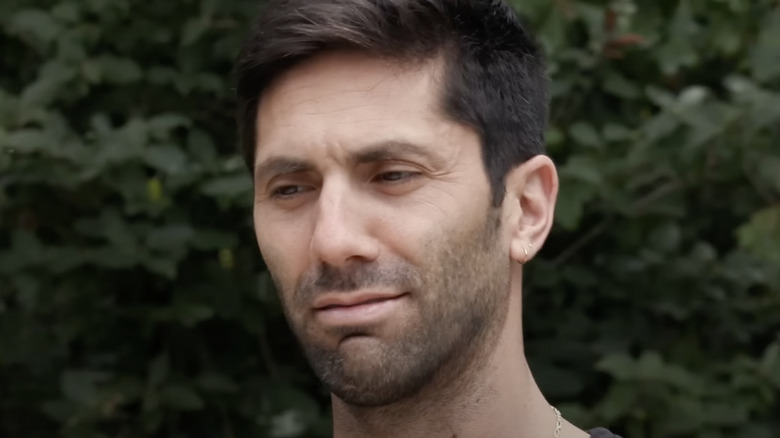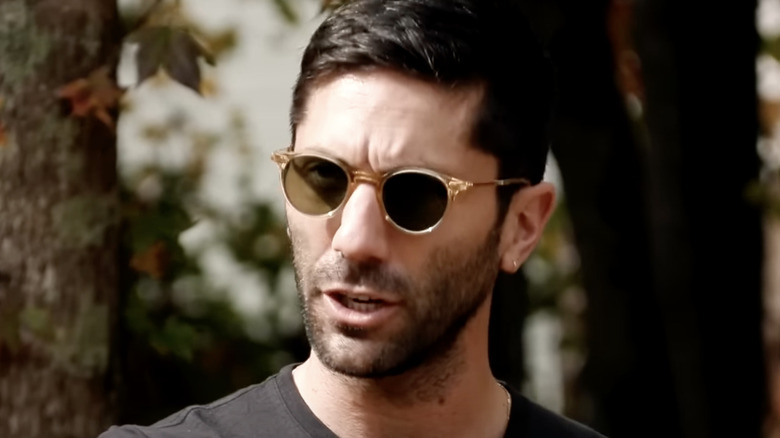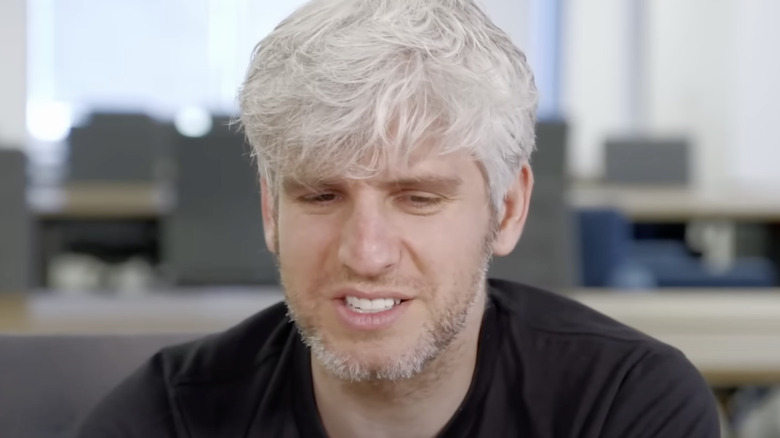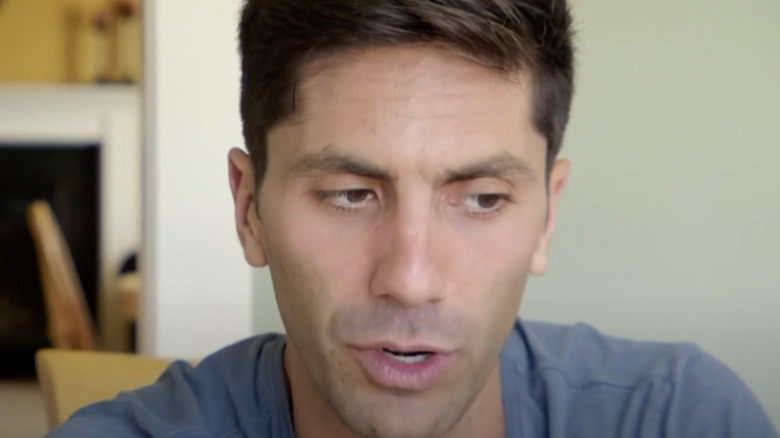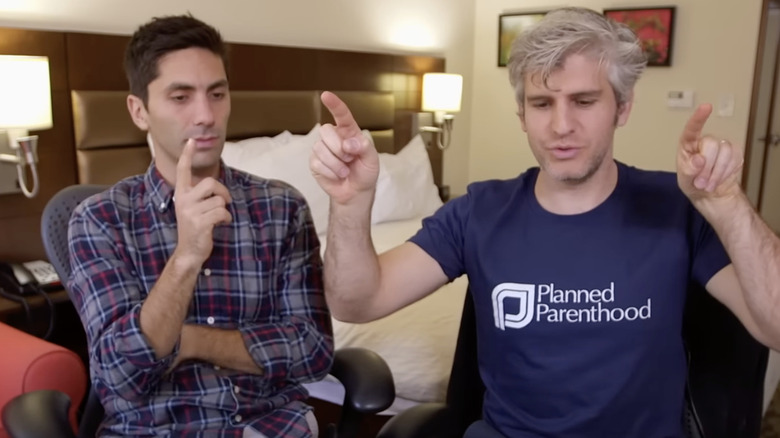Reasons Why The MTV Show 'Catfish' Is Fake
MTV's programming is forever in flux in pursuit of young viewers. After MTV stopped playing music videos, it created youth-oriented programming and hit it big with "Catfish," an expansion of a film documentary of the same name. There's just something about seeing people confront liars — with whom they engaged in lengthy long-distance relationships under false pretenses — that's fascinating to some and unfortunately relatable to others. "Catfish: The TV Show" demonstrates to viewers that the internet and relationships can both be frightening terrain where the truth can be easily obscured.
It's part of the tragedy of "Catfish" host Nev Schulman that he was once the victim of technologically-based romance fraud. Now, Schulman and his assorted co-hosts have traveled across the U.S. nearly 300 times to assist people who are in long, intimate, online relationships with people who may not be who they say they are (and can't seem to find a working 4K webcam). There's so much potential for danger along the way, and along with the strange rules reality TV stars have to follow, there must be some fail-safes in place to guarantee explosive TV without anybody getting physically hurt. Indeed, the show quietly employs a few practices to get the desired result. Here are all the ways that "Catfish" is staged or just plain faked.
Catfish recruits the liars as well as the victims
Almost every "Catfish" episode follows a formula. Host Nev Schulman and his assistant open an email or field a video call from an individual under romantic duress. They need the show to help them confirm a strong suspicion that their partner, whom they've never physically met, may not be the person they've presented themselves to be throughout their entirely online relationship.
This does not generally reflect how "Catfish" attracts the real people seen on the show. Producers actively seek out the catfisher, or the person suspected of perpetrating acts of identity fraud, not necessarily the victim. A casting application for "Catfish" includes leading questions like, "Do you have a secret or something to confess to your online partner?" and "Have you made any fake online profiles?" according to Vulture. "It's often the catfish we hear from first because they're looking to unburden themselves," MTV executive Marshall Eisen told Vulture. "It's not always the case, but it probably happens more than people realize."
Only later on in the application are there listed any inquiries for people who think they're being victimized. "It was 'If you are in a relationship and you haven't met that person, we'd like to talk to you about appearing on television,'" producer Tom Forman explained to Entertainment Weekly.
The confronted parties know what's coming
The big turn in a "Catfish" episode is the confrontation: The online liar is called out for their manipulations and falsifications, while their victim gets to see for the first time who they've really been keeping up a relationship with for so long. "We're not doing an ambush show," MTV executive Marshall Eisen told Vulture, even though that's exactly what "Catfish" appears to be.
But Eisen is right: "Catfish" participants who were in the wrong don't suddenly have to face a camera crew with Nev Schulman and their upset online lover, all forcing them to quickly own up to their bad deeds. The catfish knows the "Catfish" crew is coming to their house, and not just because of that phone call Schulman sometimes makes to arrange the meeting. Before the shooting of an episode begins, producers contact everyone involved and get them to sign a waiver and participate in a background check. Even the confronted person has agreed, in writing, to star on that "Catfish" episode, as well as to show up for the climactic face-to-face showdown.
The producers are a step ahead of everybody
Every episode of "Catfish" is carefully planned and timed to ensure plenty of massive, pre-commercial break cliffhangers. As the plot thickens, "Catfish" host and chief investigator Nev Schulman appears to reach every new development in the story at the same time as the distressed, done-wrong participant and the viewing audience. All of that, producers and executives associated with the show claim, is completely real — Schulman and cohosts really do uncover the truth about their cases as they do their detective work in front of the cameras.
But not everyone on the production is naive. The events captured for "Catfish" have been at the very least loosely mapped out ahead of time by the show's producers. They want to make watchable television with willing participants who will behave reasonably well, so they've determined the starting and end points of every "Catfish" story. They simply nudge Schulman and company in the right direction as they conduct their investigations. "Our whole mantra for the guys is, 'If you can't figure it out, just go with it and see where it takes you,'" MTV executive Marshall Eisen told Vulture. Before shooting begins, and before Schulman can locate and identify them, production staffers go so far as to find the catfisher, followed by them authorizing a background check and psychological profiling.
They're not doing cold takes on the air
The creative and on-screen talent that drive the MTV version of "Catfish" share a background in documentary filmmaking. In part to maintain the vitality and in-the-moment truthfulness of their show, there's a production credo to which the show's participants abide: "We never do a second take," main "Catfish" host Nev Schulman told Flavorwire. However, because they can't re-shoot things — since that would falsify and negate the show that at least superficially strives for truth and accuracy – filming errors result. And those point to Schulman and his cohosts being given details about their cases before their discovery phase necessarily begins.
In one incident from the Season One "Catfish" episode "Rod and Ebony," Schulman reads out an email sent in by a man named Rod, who admits to using a phony name and purloined photos to woo a woman. Schulman then calls Rod and at the end, says (per Reddit), "If you're serious about it, I'd love to bring Max and the crew down to Mississippi to meet you." Before that statement, at no point in the show did Rod reveal his address. That location may have been stated on camera at some point and then edited out of the broadcast cut, but this still represents some sloppy, information-obscuring, timeline-confusing production choices.
It takes a lot longer to solve the mystery than seen on TV
Taken at face value, or as it's portrayed on-screen in hundreds of episodes, it seems like it doesn't take much time or labor for "Catfish" to uncover the true identity of its targeted online miscreants. After a bit of poking around social media networks and a reverse image search or two, host Nev Schulman and his assistants look to be experts in exposing identity thieves and online scams. After all, it appears as if it takes them just a few minutes to bust a case wide open, but the reality is quite different.
Not only have a team of producers conducted a lot of the initial research before Schulman and his one assistant get going, but "Catfish" editors smoothly truncate many hours of computer-based work. "The guys are better at it now, but it's not always obvious how to crack these things. We've condensed what's taken them ten hours in some instances into five or six minutes, but we try to show that it was difficult," MTV executive Marshall Eisen explained to Vulture.
The participants' backstories may not be entirely accurate
Reality shows use a lot of tricks to ensure that they're producing compelling, dramatic television, which means that the actions depicted on screen aren't exactly reflective of actual reality. Shows like MTV's "Catfish" blur the line between narrative TV and documentary, and that's done so on purpose by producers, who juice stories, allow for careful editing, or condense or rearrange the timeline of events to create more scandal and nuance versus what may really be present.
For example, two different participants in two separate "Catfish" episodes told Hollywood.com that the show characterized their profiled relationships as romantic in nature, when in fact they were only ever just friendships. Instead, they were presented with a phony love angle to seem more intense and dramatic. Another "Catfish" subject said the series suggested her relationship in question had gone on for one month, whereas it had really been happening for three months by the time the show took on her case. "Really, I'm just frustrated that people don't know the whole story," another misrepresented and anonymous "Catfish" subject told Hollywood.com.
Catfishers and and their victims are not abandoned after the show's conclusion
Following a confrontation of a catfisher by the person they victimized, "Catfish" often concludes with the guilty party explaining their actions and revealing a mental health diagnosis or trauma. And then they're seemingly abandoned by their now former online love and a large television crew. "Catfish" may give a brief update as to their whereabouts and general state, but it would seem like the fraudster is almost always left to figure out a very complicated and fraught situation on their own.
Fortunately, the reality of the aftermath of a "Catfish" appearance isn't as harsh as it seems on MTV, as the show offers mental health counseling immediately after filming has commenced. Speaking with an expert is even a mandatory part of the production agreement. "We want to make sure that a professional is there in case the person needs it," MTV executive Marshall Eisen told Vulture. "Fortunately we haven't had any issues after the show has aired, but we need to make sure that people are taken care of if they need to be."
That therapist also serves as a participant evaluator — if the catfisher is deemed to have serious mental health issues, they won't be put on television. "Part of our job is to worry. We have a therapist reach out to them afterward, and there are a lot of stories we don't shoot," producer Tom Forman told Entertainment Weekly. "If somebody's got real emotional issues, it would be irresponsible for us to shoot that."
